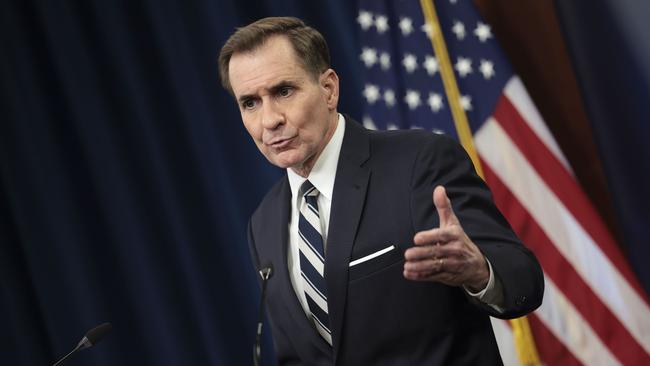Nuke war fears led to US veto of Pole gift of MiG-29 fighter jets
The Pentagon argues the best way help Ukraine is through the provision of weapons and air defence systems.

The Pentagon has ridiculed as “laughable and absurd” Russian claims the US had contributed to a biological weapons laboratory in Ukraine, as it warned a plan to transfer jet fighters from Poland to Kyiv had the potential to trigger a nuclear war.
Pentagon spokesman John Kirby said on Thursday AEDT the risk of “broader, deeper, wider and non-conventional conflict” with Russia had dissuaded the US from accommodating a surprise Polish offer to send its entire fleet of Soviet-era MiG-29s to Ukraine via US air bases in Germany.
“Whatever decision we make, whatever support we give, and leadership we show, it is not going to be in a way that makes the conflict escalatory,” Mr Kirby said, revealing US intelligence had designated the proposal as “high-risk”.
“Russia is a nuclear power no question about that,” he added, arguing the best way to help Ukraine was through the provision of weapons and air defence systems.”
The remarks came as Russia, whose forces remain bogged down surrounding Ukrainian cities as the conflict entered a third week, said its military forces had found evidence of a biological weapons program in eastern Ukraine, including specimens of deadly pathogens anthrax and plague.
Maria Zakharova, Russia’s Foreign Ministry spokeswoman, said the supposed program was financed by the US. “We are not talking here about peaceful uses or scientific goals,” she said.
White House Press Secretary Jen Psaki dismissed the charge as “preposterous … conspiracy theories” in a statement, ahead of an equally forceful and angry denial by the State Department later in the day.
“It’s Russia that has a long and well-documented track record of using chemical weapons, including in attempted assassinations and poisoning of Putin’s political enemies like Alexey Navalny,” Ms Psaki said.
Poland, which operates Russian-made MiG-29s, which Ukrainian pilots are trained to fly, had blindsided Washington on Tuesday with a public offer to fly all 28 of its jets to the American air base in Ramstein, for the US to transfer to Ukraine.
The offer proposals followed repeated calls by Ukrainian President Volodymyr Zelensky for NATO to provide his defence forces with additional jets, as well as to establish a no-fly zone above the nation, another suggestion the US had dismissed as too risky.
Mr Kirby said Ukraine already had “several squads” of “fully mission-capable aircraft”, and adding more wouldn’t make the Ukrainian defences more effective against Russia’s, which had so failed to dominate Ukraine’s airspace.
The retired rear admiral said other NATO nations could make up their own minds about how to help Ukraine, but doubted whether any would provide fighters to Ukraine without US support.
Defence Secretary Lloyd Austin, who will travel to Brussels next week for talks with his NATO counterparts, conveyed the US position to the Polish and Ukrainian defence ministers on Wednesday by telephone. Mr Kirby praised Poland as “a valued ally, and very good friend”.
“The Poles are doing an amazing job, caring for more than 1 million Ukrainians, about half the total who’ve left country,” he said.
The awkward clarifications – some reports suggest the US had initially privately encouraged the offer — came as Vice-President Kamala Harris touched down in Warsaw as part of her third European trip this year, where she was due to meet Polish President Andrzej Duda and Canadian Prime Minister Justin Trudeau, also visiting, to help co-ordinate NATO’s response to Russia.
Ms Harris’s performance will come under intense scrutiny during the three-day trip, coming at a delicate time for US relations with Eastern European nations worried about Russian designs beyond Ukraine.




To join the conversation, please log in. Don't have an account? Register
Join the conversation, you are commenting as Logout